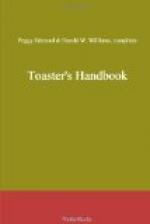A sense of humor, as was intimated before, is the chiefest of the virtues. It is more than this—it is one of the essentials to success. For, as has also been pointed out, we, being a practical people, put our humor to practical uses. It is held up as one of the prerequisites for entrance to any profession. “A lawyer,” says a member of that order, must have such and such mental and moral qualities; “but before all else”—and this impressively—“he must possess a sense of humor.” Samuel McChord Crothers says that were he on the examining board for the granting of certificates to prospective teachers, he would place a copy of Lamb’s essay on Schoolmasters in the hands of each, and if the light of humorous appreciation failed to dawn as the reading progressed, the certificate would be withheld. For, before all else, a teacher must possess a sense of humor! If it be true, then, that the sense of humor is so important in determining the choice of a profession, how wise are those writers who hold it an essential for entrance into that most exacting of professions—matrimony! “Incompatibility in humor,” George Eliot held to be the “most serious cause of diversion.” And Stevenson, always wise, insists that husband and wife must he able to laugh over the same jokes—have between them many a “grouse in the gun-room” story. But there must always be exceptions if the spice of life is to be preserved, and I recall one couple of my acquaintance, devoted and loyal in spite of this very incompatibility. A man with a highly whimsical sense of humor had married a woman with none. Yet he told his best stories with an eye to their effect on her, and when her response came, peaceful and placid and non-comprehending, he would look about the table with delight, as much as to say, “Isn’t she a wonder? Do you know her equal?”
Humor may be the greatest of the virtues, yet it is the one of whose possession we may boast with impunity. “Well, that was too much for my sense of humor,” we say. Or, “You know my sense of humor was always my strong point.” Imagine thus boasting of one’s integrity, or sense of honor! And so is its lack the one vice of which one may not permit himself to be a trifle proud. “I admit that I have a hot temper,” and “I know I’m extravagant,” are simple enough admissions. But did any one ever openly make the confession, “I know I am lacking in a sense of humor!” However, to recognize the lack one would first have to possess the sense—which is manifestly impossible.




